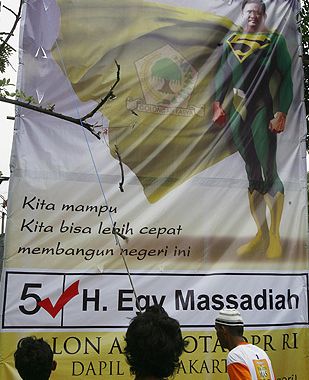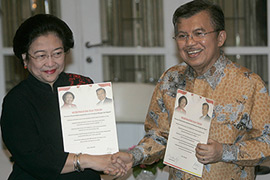Indonesia election campaign begins
Parties sign pledge to hold peaceful rallies in run-up to next month’s parliamentary vote.

“We can prove to the world that Indonesia is a well-mannered country with standards and integrity.”
Some 170 million Indonesians are eligible to vote and tens of thousands of people are expected to join rallies across the archipelago nation in the run-up to the parliamentary election on April 9.
The vote will see about 12,000 candidates vying for 128 seats in Indonesia’s upper house of parliament and 550 seats in the lower house.
The large number of candidates means that ballot papers are said to resemble newspapers.
Democratic process
The election is the third since the fall of Suharto’s presidency and is being seen as a crucial step towards cementing the democratic process in Indonesia.
“I invite all Indonesians to actively participate in the 2009 election,” Susilo Bambang Yudhoyono, the Indonesian president, said in a separate televised address on Monday.
| Indonesia polls: What’s at stake |
|
|
“Let us advance the democratic process well and campaign peacefully.”
However many of the parties have been criticised for failing to spell out their policies on key issues such as the economy, corruption and management of Indonesia’s vast natural resources.
“Almost none of the parties contesting the legislative elections have laid out a comprehensive vision for taking the nation forward, much less a program that identifies priorities they will pursue if elected,” The Jakarta Globe newspaper said in an editorial on Monday.
The main contenders are the Democratic party led by Yudhoyono, and its ally Golkar led by Yusuf Kalla, the country’s vice-president.
The Indonesian Democratic Party of Struggle (PDI-P) led by Megawati Sukarnoputri, the former president, forms the main opposition.
The outcome of the April election is hard to predict given the large number of undecided voters.
New rules
More than 170 million Indonesians will vote at least twice this year, first in April’s parliamentary elections followed by presidential polls in July, which will see Yudhoyono seek a second term on a platform of good governance, social stability and continued economic growth.
Results of the parliamentary election will determine which parties or alliances can field a candidate for the presidential election on July 8.
Under new election rules, only parties or coalitions that won 20 per cent of the votes or 25 per cent of the seats can field presidential candidates.
 |
| Megawati and Yusuf Kalla have reportedly teamed up against Yudhoyono [Reuters] |
This year’s vote will also be the first in which voters pick specific candidates for repective constituencies.
In the past voters could pick a party or an individual, but in practice the party actually decided who got the seats.
The new rules could turn minor parties into kingmakers as the main parties seek alliances.
Last week Megawati and Yusuf Kalla reportedly met amid growing speculation that their respective parties may team up against Yudhoyono’s party.
Hundreds of thousands of police are being deployed across the country as authorities step up security for the election campaign.
Analysts have warned of possible outbreaks of violence in some resource-rich areas such as Aceh province on the northern tip of Sumatra, which has seen renewed tension between supporters of the military and backers of former rebels.
There has also been speculation that violence could break out in the province of West Papua, where a long-running secessionist conflict continues to simmer.
 Reform is a central issue in the election, with the result determining whether Indonesia continues to overhaul key institutions and attract foreign investment.
Reform is a central issue in the election, with the result determining whether Indonesia continues to overhaul key institutions and attract foreign investment.